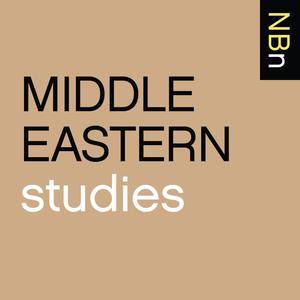
New Books in Middle Eastern Studies
Interviews with Scholars of the Middle East about their New Books
- 54 minutes 29 secondsThe Political Ecology of Violence: Peasants and Pastoralists in the Last Ottoman Century
From the nineteenth to the early twentieth centuries, recurrent and extreme climate disruptions became an underlying yet unacknowledged component of escalating conflict between Christian Armenian peasants and Muslim Kurdish pastoralists in Ottoman Kurdistan. By the eve of the First World War, the Ottoman state's shifting responses to these mounting tensions transformed the conflict into organized and state-sponsored violence.
In her book The Political Ecology of Violence: Peasants and Pastoralists in the Last Ottoman Century (University of Cambridge Press, 2024), Dr. Zozan Pehlivan examines the impact of climate on local communities, their responses and resilience strategies, arguing that nineteenth-century ecological change had a transformative and antagonistic impact on economy, state, and society.
Learn more about your ad choices. Visit megaphone.fm/adchoices
Support our show by becoming a premium member! https://newbooksnetwork.supportingcast.fm/middle-eastern-studies
15 January 2025, 9:00 am - 52 minutesDavid G. Hunter et al., "Brill Encyclopedia of Early Christianity: Authors, Texts, and Ideas" (Brill, 2024)
The Brill Encyclopedia of Early Christianity: Authors, Texts, and Ideas (Brill, 2024) focuses on the history of early Christianity, covering texts, authors, ideas, and their reception. Its content is intended to bridge the gap between the fields of New Testament studies and patristics, connecting a number of related fields of study including Judaism, ancient history and philosophy, covering the whole period of early Christianity up to 600 CE.
The BEEC aims both to provide a critical review of the methods used in Early Christian Studies and also to update the history of scholarship.
The BEEC addresses a range of traditions, including iconographic, martyrological, ecclesiastical, and Christological traditions, as well as cultic phenomena, such as the veneration of saints. The history of the transmission of texts and the reception of early Christian writers are also addressed. The BEEC focuses on early Christianity from a historical perspective in order to uncover the lasting legacy of the authors and texts until the present day.
David G. Hunter is the Margaret O'Brien Flatley Chair of Catholic Theology at Boston College.
Caleb Zakarin is editor at the New Books Network.
Learn more about your ad choices. Visit megaphone.fm/adchoices
Support our show by becoming a premium member! https://newbooksnetwork.supportingcast.fm/middle-eastern-studies
8 January 2025, 9:00 am - 1 hour 17 minutesOlga Borovaya, "The 1840 Rhodes Blood Libel: Ottoman Jews at the Dawn of the Tanzimat Era" (Berghahn Books, 2024)
The Rhodes blood libel of 1840, an outbreak of anti-Jewish violence, was initiated by the island’s governor in collusion with Levantine merchants, who charged the local Jewish community with murdering a Christian boy for ritual purposes. An episode in the shared histories of Ottomans and Jews, it was forgotten by the former and, even if remembered, misunderstood by the latter. The 1840 Rhodes Blood Libel: Ottoman Jews at the Dawn of the Tanzimat Era (Berghahn Books, 2024) aims to restore the place of this event in Sephardi and Ottoman history.
Based on newly discovered Ottoman and Jewish sources it argues that the acquittal of Rhodian Jews is adequately understood only in the context of the Tanzimat and the Sublime Porte’s foreign relations. Contrary to the common view that Ottoman Jews did not experience the impact of the Tanzimat reforms until the mid-1850s, this study shows that their effects were felt as early as 1840. Furthermore, this book offers a window onto life and intercommunal relations in the Eastern Mediterranean during the late Ottoman era.
Learn more about your ad choices. Visit megaphone.fm/adchoices
Support our show by becoming a premium member! https://newbooksnetwork.supportingcast.fm/middle-eastern-studies
5 January 2025, 9:00 am - 1 hour 10 minutesThe Hyphen Unites: Avi Shlaim on Arab-Jewish Life
Avi Shlaim is a celebrated "New Historian” whose earlier work established him as an influential historian of Middle Eastern politics and especially of Israel's relations with the Arab world. Most recently he has turned to his own Iraqi/Israeli/British past in Three Worlds: Memoirs of an Arab-Jew–which he refers to as an "impersonal autobiography."
He speaks today to John and his Brandeis colleague Yuval Evri, the Marash and Ocuin Chair in Ottoman, Mizrahi and Sephardic Jewish Studies. Yuval’s 2020 The Return to Al-Andalus: Disputes Over Sephardic Culture and Identity Between Arabic and Hebrew explores how fluidity in such categories as the "Arab-Jew" becomes a source of resistance to exclusive claims of ownership of land, texts, traditions, or languages.
The three quickly agree that the crucial category for understanding Avi's latest work is that of the Arab Jew: "I am a problem for Zionists, an ontological impossibility....[as] a living breathing standing Arab Jew. A problem for them but not for me." Coexistence for him is not remote, but something that the Iraqi Jewish community experienced and touched on a daily basis.
In describing the factors that sped migration from Iraq to Israel in its early years, Shlaim lays bare some evidence for Mossad involvement in three for the Baghdad bombs that hastened the flight from Baghdad. That bombing forms part of the “Cruel Zionism” that Avi sees having gravely damaged the possibilities of Middle Eastern religious coexistence.
He also discusses the 1954 Lavon affair, and more generally reflects on the way that Zionism ("an Ashkenazi thing") conscripted Arab Jews into its political formation (This is a topic also discussed extensively in RTB"s conversation with Natasha Roth-Richardson and Lori Allen, in Violent Majorities). True, there is a much-discussed 1941 Baghdadi pogrom, The Farhud. It stands alone in the area and by Shlaim's account was largely a product of British colonialism in Iraq, with its divisive elevation of Christians and Jews over Muslims.
Yuval asks Avi to discuss the power (or permission) to narrate stories told from below. Avi's tales of his own mother's resourcefulness and his father’s struggles betoken the range of poignant response to what for so many Arab Jews was not aliyah (ascent) but a yerida, a descent into marginality, unemployment, and cultural exclusion.
To Avi, a single state of Israel/Palestine seems the best hope to ward off the worst that may come from the accelerated ethnic cleansing of both Gaza and the West Bank, which may lead to a second Nakba.
Mentioned in the podcast
- Avi Shlaim, Collusion across the Jordan: King Abdullah, the Zionist Movement, and the Partition of Palestine (1988)
- Avi Shlaim, The Iron Wall: Israel and the Arab World (1988)
- The New Historians of Israel/Palestine.
- Joel Beinin, The Dispersion of Egyptian Jewry (1998)
- Alliance Israelite Universelle
- Salo Baron anatomizes the "lachrymose version of Jewish history"; e.g. in his 1928 “Ghetto and Emancipation: Shall We Revise the Traditional View?”
- Noam Chomsky called settler colonialism the most extreme and vicious form of imperialism.
Recallable Books
- Avi credits the influential work of Ella Shohat on the idea of the Arab Jew and "cruel Zionism." One pathbreaking article was her 1988 "Sephardim in Israel: Zionism from the Standpoint of Its Jewish Victims." but he recommends On the Arab Jew. In her work the hyphen unites rather than divides Arab and Jew.
- Yehoudah Shinhav, The Arab Jews (2006).
- Sami Michael
- Shimon Ballas, Outcast (1991).
- Michael Kazin, A Walker in the City (1951) and the rest of his New York trilogy.
Listen and Read here.
Learn more about your ad choices. Visit megaphone.fm/adchoices
Support our show by becoming a premium member! https://newbooksnetwork.supportingcast.fm/middle-eastern-studies
3 January 2025, 9:00 am - 26 minutes 14 secondsRobert D. Miller II, "Yahweh: Origin of a Desert God" (Vandenhoeck & Ruprecht, 2021)
Recognizing the absence of a God named Yahweh outside of ancient Israel, this study addresses the related questions of Yahweh's origins and the biblical claim that there were Yahweh-worshipers other than the Israelite people. Beginning with the Hebrew Bible, with an exhaustive survey of ancient Near Eastern literature and inscriptions discovered by archaeology, and using anthropology to reconstruct religious practices and beliefs of ancient Edom and Midian, this study proposes an answer. Yahweh-worshiping Midianites of the Early Iron Age brought their deity along with metallurgy into ancient Palestine and the Israelite people. Join us as we talk with Robert Miller about his latest book, Yahweh: Origin of a Desert God (Vandenhoeck & Ruprecht, 2021).
Robert Miller, II, O.F.S., Ph.D., is Ordinary Professor of Old Testament and Associate Dean for Graduate Studies at The Catholic University of America.
Michael Morales is Professor of Biblical Studies at Greenville Presbyterian Theological Seminary, and the author of The Tabernacle Pre-Figured: Cosmic Mountain Ideology in Genesis and Exodus(Peeters, 2012), Who Shall Ascend the Mountain of the Lord?: A Biblical Theology of Leviticus(IVP Academic, 2015), and Exodus Old and New: A Biblical Theology of Redemption(IVP Academic, 2020). He can be reached at [email protected]
Learn more about your ad choices. Visit megaphone.fm/adchoices
Support our show by becoming a premium member! https://newbooksnetwork.supportingcast.fm/middle-eastern-studies
31 December 2024, 9:00 am - 58 minutes 39 secondsFranck Salameh, "Lebanon’s Jewish Community: Fragments of Lives Arrested" (Palgrave Macmillan, 2018)
This was an interview that I felt only scratched the surface not only of the book, Lebanon’s Jewish Community: Fragments of Lives Arrested (Palgrave Macmillan, 2018) but of Professor Salameh's knowledge and understanding of the region. Our discussion spanned the ancient roots of the people of Lebanon through his personal story growing up in the multicultural city of Beirut through the current state of affairs in Lebanon. Growing up as a Maronite his first exposure to Jews in Lebanon was an absentee neighbor who would come to air out and check on the house maybe once a month. He did not know what to make of her - but then when he was studying for his Baccalaureate she sent a message that she was carrying out a nine day novena to the Virgin Mary on his behalf. This cross-culture was the basis for the thriving Jewish community in Lebanon.
Unfortunately we did not touch upon the interviews that he conducted as there was just so much to say. I want to share here one that puts things in context - he writes about Alain who lives today in Northern Israel, a mere two-hour car ride from his native Beirut but worlds away from the port city. Franck himself talks about the last time he was in Lebanon, in 2016, and how he felt he could never go back.
Another moving interview is that of Fady Galen who talks about wearing tefillin (phylacteries) in his Catholic school.
Through the good and bad it was so wonderful to speak about the possibilities and the fanatics. As Franck said, he is human and therefore the passion will show in his scholarly work and his writing - it definitely showed in our discussion.
Learn more about your ad choices. Visit megaphone.fm/adchoices
Support our show by becoming a premium member! https://newbooksnetwork.supportingcast.fm/middle-eastern-studies
27 December 2024, 9:00 am - 1 hour 6 minutesAnne K. Bang, "Zanzibari Muslim Moderns: Islamic Paths to Progress in the Interwar Period" (Oxford UP, 2024)
Zanzibari Muslim Moderns: Islamic Paths to Progress in the Interwar Period (Oxford UP, 2024) is a historical study of Zanzibar during the interwar years. This was a period marked by rapid intellectual and social change in the Muslim world, when ideas of Islamic progress and development were hotly debated. How did this process play out in Zanzibar?
Based on a wide range of sources—Islamic and colonial, private and public—Anne K. Bang examines how these concepts were received and promoted on the island, arguing that a new ideal emerged in its intellectual arena: the Muslim modern. Tracing the influences that shaped the outlook of this new figure, Bang draws lines to Islamic modernists in the Middle East, to local Sufi teachings, and to the recently founded state of Saudi Arabia. She presents the activities of the Muslim modern in the colonial employment system, as a contributor to international debates, as an activist in the community, and more. She also explores the formation of numerous faith-based associations during this period, as well as the views of the Muslim modern on everything from funerary practices and Mawlid celebrations to reading habits. A recurring theme throughout is the question with which many Muslim moderns were confronted: who should implement development? And for whom?
Anne K. Bang is Professor of African Islamic History at the University of Bergen. She has published widely on Islamic intellectual exchanges in the Indian Ocean, and particularly on East Africa. She has also led several projects to bring the scriptural sources of this history to wider attention.
Ahmed Y. AlMaazmi is an Emirati historian who focuses on the intersection of occultism and imperialism in the Indian Ocean world. After completing his studies in cultural anthropology at Rutgers University as a Fulbright fellow, he pursued a PhD in Near Eastern Studies at Princeton University. His dissertation, An Enchanted Sea: Occultism and Imperialism in the Early Modern Indian Ocean World, 1450-1750, examines the connected histories of occult sciences and empire-building across Arabia, East Africa, and South Asia, told through intellectual projects that accompanied the rise of the Omani Yaʿrubī Empire and its diasporic communities. His recent work includes the article, “I Authored This Book in the Absence of My Slave: Enslaved East Africans and the Production of Occult Knowledge across the Omani Empire,” published in Monsoon Journal.
Learn more about your ad choices. Visit megaphone.fm/adchoices
Support our show by becoming a premium member! https://newbooksnetwork.supportingcast.fm/middle-eastern-studies
18 December 2024, 9:00 am - 1 hour 2 minutesYaacov Yadgar, "To Be a Jewish State: Zionism as the New Judaism" (NYU Press, 2024)
In one of the first books to ask head-on what it means for Israel to be a Jewish state, Yaacov Yadgar delves into what the designation "Jewish" amounts to in the context of the sovereign nation-state, and what it means for the politics of the state to be identified as Jewish. The volume interrogates the tension between the notion of Israel as a Jewish state--one whose very character is informed by Judaism--and the notion of Israel as a "state of the Jews," with the sole criterion the maintenance of a demographically Jewish majority, whatever the character of that majority's Jewishness might or might not be.
The volume also examines Zionism's relationship to Judaism. It provocatively questions whether the Christian notion of supersessionism, the idea that the Christian Church has superseded the nation of Israel in God's eyes and that Christians are now the true People of God, may now be applied to Zionism, with Zionism understood by some to have taken over the place of traditional Judaism, rendering the actual Jewish religion superfluous.
To Be a Jewish State: Zionism as the New Judaism (NYU Press, 2024) deeply informs the democratic crisis in Israel, discussing whether Jewish laws put into effect by the state or political moves made to ensure a Jewish majority can be seen as undermining democracy. In our current era, with nationalism resurging, To Be a Jewish State urges a critical re-assessment of the very meaning of modern Jewish identity.
Learn more about your ad choices. Visit megaphone.fm/adchoices
Support our show by becoming a premium member! https://newbooksnetwork.supportingcast.fm/middle-eastern-studies
16 December 2024, 9:00 am - 1 hour 18 minutesAzad Essa, "Hostile Homelands: The New Alliance Between India and Israel" (Pluto Press, 2023)
Under Narendra Modi, India has changed dramatically. As the world attempts to grapple with its trajectory towards authoritarianism and a 'Hindu Rashtra' (Hindu State), little attention has been paid to the linkages between Modi's India and the governments from which it has drawn inspiration, as well as military and technical support.
India once called Zionism racism, but, as Azad Essa argues, the state of Israel has increasingly become a cornerstone of India's foreign policy. Looking to replicate the 'ethnic state' in the image of Israel in policy and practice, the annexation of Kashmir increasingly resembles Israel's settler-colonial project of the occupied West Bank. The ideological and political linkages between the two states are alarming; their brands of ethnonationalism deeply intertwined.
Hostile Homelands: The New Alliance Between India and Israel (Pluto Press, 2023) puts India's relationship with Israel in its historical context, looking at the origins of Zionism and Hindutva; India's changing position on Palestine; and the countries' growing military-industrial relationship from the 1990s. Lucid and persuasive, Essa demonstrates that the India-Israel alliance spells significant consequences for democracy, the rule of law and justice worldwide.
Azad Essa is an award-winning journalist and author based between Johannesburg and New York City. He is currently a senior reporter for Middle East Eye covering American foreign policy, Islamophobia and race in the US. He is the author of The Moslems are Coming and Zuma's Bastard and has written for Al Jazeera, The Washington Post, Foreign Policy and the Guardian.
Stuti Roy has recently graduated with an MPhil in Modern South Asian Studies from the University of Oxford.
Learn more about your ad choices. Visit megaphone.fm/adchoices
Support our show by becoming a premium member! https://newbooksnetwork.supportingcast.fm/middle-eastern-studies
13 December 2024, 9:00 am - 1 hour 2 minutesSamuel Hodgkin, "Persianate Verse and the Poetics of Eastern Internationalism" (Cambridge UP, 2023)
At the height of literary nationalisms in the twentieth century, leftist internationalists from Turkey, Iran, Afghanistan, India, and the Soviet East bonded over their shared love of the classical Persian verses of Hafiz and Khayyam. At writers' congresses and in communist literary journals, they affirmed their friendship and solidarity with lyric ghazals and ruba'iyat. Persianate poetry became the cultural commons for a distinctively Eastern internationalism, shaping national literatures in the Soviet Union, the Middle East, and South Asia. By the early Cold War, the literary entanglement between Persianate culture and communism had established models for cultural decolonization that would ultimately outlast the Soviet imperial project. In the archive of literature produced under communism in Persian, Tajik, Dari, Turkish, Uzbek, Azerbaijani, Armenian, and Russian, this book finds a vital alternative to Western globalized world literature.
Samuel Hodgkin is Assistant Professor of Comparative Literature at Yale University. His articles have appeared in Comparative Literature Studies, Iranian Studies, Philological Encounters, Cahiers de Studia Iranica, and Cahiers d'Asie centrale.
Morteza Hajizadeh is a Ph.D. graduate in English from the University of Auckland in New Zealand. His research interests are Cultural Studies; Critical Theory; Environmental History; Medieval (Intellectual) History; Gothic Studies; 18th and 19th Century British Literature. YouTube channel. Twitter.
Learn more about your ad choices. Visit megaphone.fm/adchoices
Support our show by becoming a premium member! https://newbooksnetwork.supportingcast.fm/middle-eastern-studies
12 December 2024, 9:00 am - 1 hour 7 minutesWendy Pearlman, "The Home I Worked to Make: Voices from the New Syrian Diaspora" (Liveright, 2024)
War forced millions of Syrians from their homes. It also forced them to rethink the meaning of home itself.
In 2011, Syrians took to the streets demanding freedom. Brutal government repression transformed peaceful protests into one of the most devastating conflicts of our times, killing hundreds of thousands and displacing millions.
The Home I Worked to Make: Voices from the New Syrian Diaspora (Liveright, 2024) takes Syria’s refugee outflow as its point of departure. Based on hundreds of interviews conducted across more than a decade, it probes a question as intimate as it is universal: What is home? With gripping immediacy, Syrians now on five continents share stories of leaving, losing, searching, and finding (or not finding) home. Across this tapestry of voices, a new understanding emerges: home, for those without the privilege of taking it for granted, is both struggle and achievement. Recasting “refugee crises” as acts of diaspora-making, The Home I Worked to Make challenges readers to grapple with the hard-won wisdom of those who survive war and to see, with fresh eyes, what home means in their own lives.
Roberto Mazza is currently a visiting scholar at the Buffett Institute for Global Affairs at Northwestern University. He is the host of the Jerusalem Unplugged Podcast and to discuss and propose a book for interview can be reached at [email protected]. Twitter and IG: @robbyref Website: www.robertomazza.org
Learn more about your ad choices. Visit megaphone.fm/adchoices
Support our show by becoming a premium member! https://newbooksnetwork.supportingcast.fm/middle-eastern-studies
10 December 2024, 8:00 am - More Episodes? Get the App
Your feedback is valuable to us. Should you encounter any bugs, glitches, lack of functionality or other problems, please email us on [email protected] or join Moon.FM Telegram Group where you can talk directly to the dev team who are happy to answer any queries.
 The President’s Inbox
The President’s Inbox
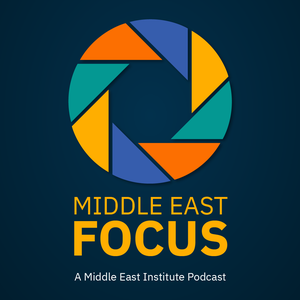 Middle East Focus
Middle East Focus
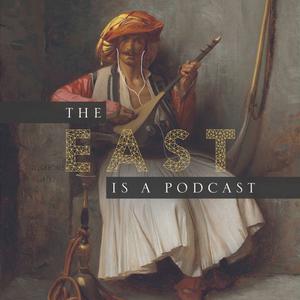 The East is a Podcast
The East is a Podcast
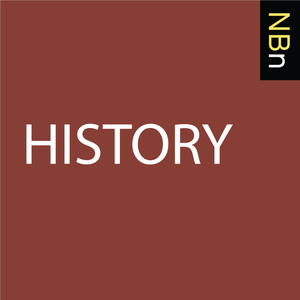 New Books in History
New Books in History
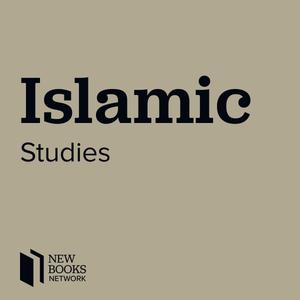 New Books in Islamic Studies
New Books in Islamic Studies
 The Brookings Cafeteria
The Brookings Cafeteria